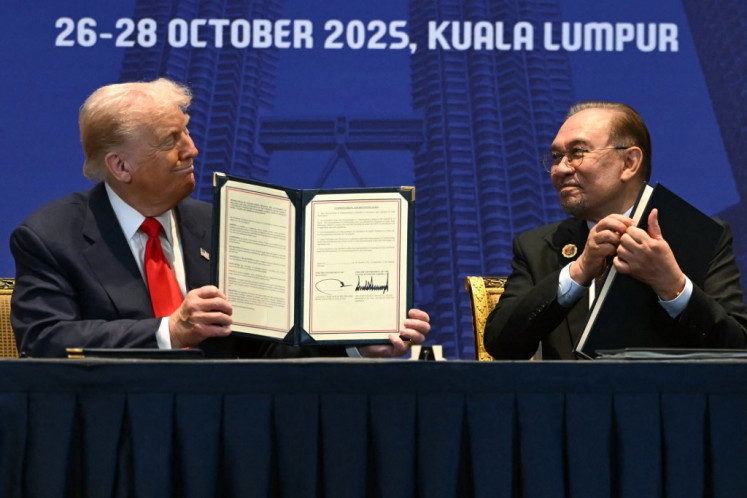Popular Reads
Top Results
Can't find what you're looking for?
View all search resultsPopular Reads
Top Results
Can't find what you're looking for?
View all search resultsEvenings with (reluctant) literary masters
âPoems are inevitable
Change text size
Gift Premium Articles
to Anyone
'Poems are inevitable. Every nation has its own poem,' said poet Abdul Hadi WM after reading a number of his Sufi-influenced poems at the Salihara Cultural Center in South Jakarta on Saturday.
He is among the literary luminaries reading their works at an event titled Malam Para Empu (Evenings of the Masters). The event is being held as a close to the Salihara Literary Biennale.
Evenings of the Masters is an event spanning two evenings that presents luminaries that have been dedicating their lives to literature for more than four decades.
The Salihara Literary Biennale's theme this year is 'Literary Circus', where circus is considered a celebration of fantasy and 'the other' with a certain level of involvement as well as estrangement.
Renowned playwright Nano Riantiarno was happy to be included among the list of literary figures. 'Throughout these years, playwrights are often not considered litterateurs. As a playwright, I rarely get referred to as a professional writer,' he said prior to his performance.
The biennale organizer considered the litterateurs as those whose esthetic achievements and works had become an important part of Indonesia's literary history. At the event, the writers read a selection of some of their works.
Abdul Hadi, Danarto, Nano and Marion Bloem performed on Saturday, while Arswendo Atmowiloto, Leon Agusta, Putu Wijaya and Sori Siregar will perform on Sunday at 8 p.m.
Nano read a chapter from his novel Cermin Cinta (Love Mirror) ' the final part of the Cermin trilogy, which was first published in 2006.
The 64-year-old shrugged when asked about the label 'masters'. 'I don't know; [the organizers] are the ones that say that,' Nano said.
A similar feeling of indifference ' if not disapproval ' was also shared by other great names in the event.
'I don't understand about the labeling. I don't think I am responsible for the term,' said Leon Agusta, who is known for his lyric poems and will read five of his short poems on Sunday evening.
Veteran writer Putu Wijaya rationalized that the title was a marketing strategy by the organizers.
'The title was meant to be eye-catching, to attract attention,' said the 69-year-old, who has written dozens of novels and scripts as well as hundreds of short stories and essays. 'Calling another person [a master] is one thing, calling oneself [a master] is another.'
What the reluctantly titled masters did agree upon, however, was that Indonesian literature has
entered a very creative and productive period.
'The current literary development is very great. In novels alone, we see various works. Some of the poems are amazing. We have seen an extraordinary amount and
variety of poems, novels and short stories; there's a lot of imagination at work nowadays,' Nano said.
Contrary to the abundance of works being produced, there is also a concern whether Indonesians read them with similar hunger, if at all.
'This is really bothering us. We do not know whether the works are being read or not,' Leon said.
The situation was made even more saddening because reading interest was also high.
'The interest is there, but what is it that is being read? Literary works are getting a miniscule amount of readers compared to news and entertainment,' said Putu.
'Literary interest still exists, but from a very small number of people,' he added.
'We need more people reading literary works. We need politicians to read them; businesspeople should read them and so on.'










